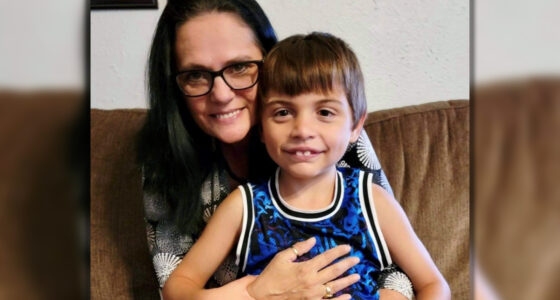
Congenital heart disease refers to the health problems that come from having a congenital (present at birth) heart defect. Congenital heart defects are the most common birth defects. The heart begins developing at conception and is fully formed by eight weeks gestation. A congenital heart defect can develop at any time during these first eight weeks of fetal development.
What is congenital heart disease?
What is congenital heart disease?
There are many types of congenital heart defects, and they can generally be categorized into three groups:
- Defects that pass too much blood through the lungs. When a defect such as atrial septal defect (ASD), ventricular septal defect (VSD) or patent ductus arteriosus (PDA) causes too much blood to pass through the lungs, the heart incorrectly pumps oxygen-rich blood to the lungs instead of circulating it through the body. This causes increased stress and pressure on the lungs.
- Defects that do not pass enough blood through the lungs. When a defect such as pulmonary stenosis (PS), tetralogy of fallot (ToF) or pulmonary atresia (PA) prevents enough blood from passing through the lungs, it allows blood that has not yet received oxygen from the lungs to travel throughout the body. This prevents the body from receiving enough oxygen, and your baby may look blue.
- Defects that do not circulate enough blood to the body. When a chamber of the heart is underdeveloped or a blood vessel contains a blockage, it can prevent the proper amount of blood from circulating through the body.
What are signs and symptoms of congenital heart disease?
While each defect can affect a different part of the heart, many symptoms of congenital heart disease are similar and can include:
- Cyanosis (a bluish tint to the skin, lips and nail beds)
- Pale, cool skin
- Rapid heart rate
- Rapid and/or heavy breathing
- Cold feet with diminished pulses
- Poor growth
In some cases, multiple defects may be present, which adds to complexity. One type of congenital heart disease that involves multiple defects is called hypoplastic left heart syndrome (HLHS). HLHS occurs when the left side of the heart does not develop correctly. The key structures of the heart that are responsible for blood to pump throughout the body—the left ventricle, mitral valve, aorta and aortic valve—are small and undeveloped instead of being healthy and strong. This stunted development makes it difficult and sometimes impossible for the heart to pump enough blood throughout the body. Without immediate treatment, a baby will not survive.
How is congenital heart disease diagnosed?
How is congenital heart disease diagnosed?
In many cases, it is possible to identify congenital heart defects before birth with a prenatal ultrasound, called a fetal echocardiogram. An expectant mother’s care should be carefully managed when her unborn child is diagnosed with congenital heart disease. Fetuses with congenital heart defects have higher risk for poor fetal growth and stillbirth. Physicians minimize these risks using ultrasound and fetal heart rate monitoring to keep a close watch during pregnancy. Prenatal diagnosis allows a carefully planned delivery at a hospital such as Riley Hospital for Children at IU Health, which is equipped to provide the level of care that may be needed immediately after birth.
Routine ultrasounds in low-risk pregnancies can identify congenital heart defects in unborn babies. Mothers with high-risk pregnancies should have more extensive testing. Detailed ultrasounds are recommended for pregnancies with increased risk of congenital heart defects in babies, as well as other birth defects. Pregnant women with specific risk factors for having a child with congenital heart disease or those who have a concerning result on a routine or detailed ultrasound should have a fetal echocardiogram, which can detect congenital heart defects in most pregnancies.
Heart defects come in hundreds of variations. The Riley Heart Center is among the nation’s top 15 high-volume sites for advanced care of congenital heart conditions, such as:
- Atrial Septal Defects
- Atrioventricular Canal Defects
- Cardiomyopathy
- D-Transposition of the Great Vessels
- Heterotaxy
- Hypoplastic Left Heart Syndrome
- Supraventricular Tachycardia
- Tetralogy of Fallot
- Truncus Arteriosus
The state of Indiana requires all newborns to be screened for congenital heart disease before they go home even when they do not show symptoms. If a defect is not identified prenatally, but your baby shows signs of congenital heart disease during a physical exam immediately after delivery, the following tests can help doctors make a diagnosis:
- Chest X-ray. A chest X-ray will show when a baby’s heart is enlarged and reveal signs of heart failure.
- Electrocardiogram (EKG). An electrocardiogram (EKG) will show if any part of the heart is enlarged and whether the heart is beating abnormally.
- Echocardiogram. Echocardiogram creates moving images of the heart and helps the doctor diagnose abnormalities.
What are treatments for congenital heart disease?
What are treatments for congenital heart disease?
From unborn and premature babies, to adults with congenital heart disease, the Riley Heart Center is one of the nation’s most respected sites for diagnosis and treatment of heart disease all through life. We have a full suite of diagnostic technology, including fetal echocardiograms, transthoracic echocardiograms, cardiac catheterizations, cardiac MRIs, and stress testing to diagnose heart problems.
If your baby is born with a heart defect, he or she will require specialized treatment in the cardiovascular intensive care unit and/or the neonatal intensive care unit (NICU). When a defect is identified prenatally, you will meet with a multidisciplinary team before your baby is born that will include a combination:
Your baby's care team will develop a management plan and discuss treatments your baby will receive in the NICU.
Most heart defects are treated with one or more surgeries, sometimes performed in stages. Some surgeries occur only after your baby's condition is stabilized in the CVICU or NICU. Infants in the CVICU or NICU may also be treated with the following:
- Ventilator. A ventilator helps your baby breathe more easily.
- IV line. An IV line (catheter) is inserted into a vein to provide medicines.
- Nasogastric tube. A nasogastric tube helps keep the stomach properly drained.
- Urinary catheter. A urinary catheter helps urine drain out of the bladder.
- Chest tube. A chest tube is a drain that is inserted to keep the chest free of blood that can accumulate after surgery.
- Heart monitor. This machine constantly measures the heart’s rhythms.
Some babies born with very complex heart disease, such as hypoplastic left heart syndrome (HLHS) or heart muscle disease, such as cardiomyopathy, may eventually need a heart transplant. The Riley Heart Center is one of only 30+ sites in the United States certified to perform pediatric heart transplants. We are also one of the nation’s few sites trained to implant total artificial hearts for babies and children. A pediatric cardiologist will work with you and your baby to determine which defects are present and what procedures are best for your child’s unique needs.
The Cardiovascular Neurodevelopmental Follow-Up Program at Riley at IU Health provides specialized long-term care to babies and children with HLHS. Your child will receive individualized care and support after each surgery. As he or she develops, the program's multidisciplinary care team will also address the common side effects of HLHS, including feeding problems, reduced physical strength and neurodevelopmental problems.
Key Points to Remember
Key Points to Remember
- Congenital heart disease refers to health problems that come from having a congenital heart defect—a common birth defect that occurs at some time during the first eight weeks of fetal development.
- Hypoplastic left heart syndrome (HLHS) is a type of congenital heart disease that occurs when the left side of the heart does not develop correctly.
- In many cases, congenital heart defects can be diagnosed before birth through a fetal ultrasound.
- The state of Indiana requires that all newborns receive screening for congenital heart disease before they are allowed to go home—even those without symptoms.
- Most heart defects will require surgical repair; some require multiple surgeries.
Support Services & Resources
Support Services & Resources
Visit the following trusted websites to learn more about congenital heart disease.
We offer a broad range of supportive services to make life better for families who choose us for their children's care.
The Centers for Disease Control and Prevention provide in-depth information about HLHS.
This National Institute of Health website provides information to the public about congenital heart defects.
Congenital Heart Disease Research
Congenital Heart Disease Research
Pediatric cardiologists, cardiac intensivists, and congenital surgeons at the Riley Heart Center are instrumental in finding better treatments for congenital heart disease, discovered through research. Our heart specialists also work closely with researchers at the Herman B Wells Center for Pediatric Research to study cardiac development and genetic conditions that provide clues about the origins of heart defects. Talk to your child’s doctor if you would like to know more about available studies and to learn if your child qualifies for participation in clinical trials.
Departments Treating This Condition
Departments Treating This Condition
- Adult Congenital Heart Disease
- Cardiology
- Cardiothoracic Surgery
- Cardiovascular Genetics Program
- Cardiovascular Intensive Care Unit
- Fetal Cardiology Program
- Maternal-Fetal Medicine
- Neonatology
- Pediatric Developmental Medicine
- Pediatric General Surgery
- Pediatric Pulmonology
- Reproductive Health Program for Adolescents & Young Adults with Congenital Heart Disease
- Riley Heart Center
Related Stories
Related Stories

Factors contributing to risk of congenital heart disease in babies
Congenital heart disease (CHD) continues to be the most common birth defect, affecting nearly 1% of all births in the U.S. each year according to the Center for Disease Control.
Continue reading
Riley Children’s Health brings complex heart care home for patients and their families
An early adopter of cardiovascular home monitoring through the National Pediatric Cardiology Quality Improvement Collaborative (NIP-QIC), Riley Children’s Health is Indiana’s only pediatric health...
Continue reading





